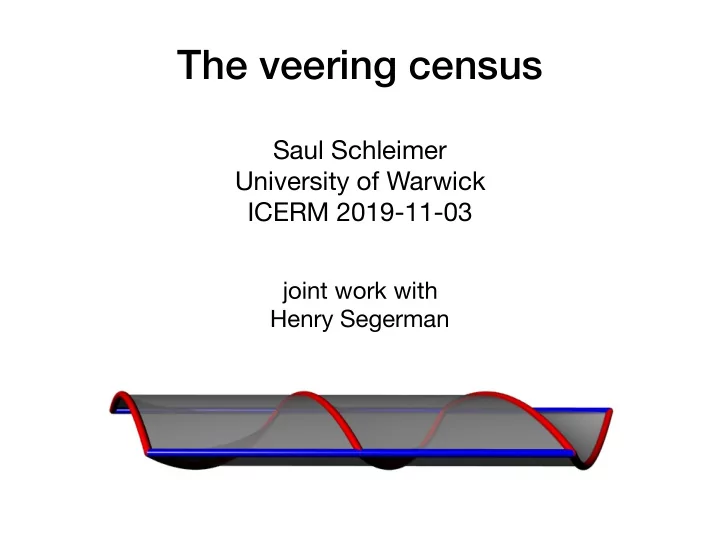

The veering census Saul Schleimer University of Warwick ICERM 2019-11-03 joint work with Henry Segerman
Illustrating Dynamics and Probability Nov 11 - 15, 2019 https://icerm.brown.edu/programs/sp-f19/
Tools and applications
Example
The (-2, 3, 7) pretzel knot
The (-2, 3, 7) pretzel knot 1 1 1 0 1 2 2 0 2 0 0 2 0 2 1 1 1 1
Triangulations
Veering tetrahedra red on top toggle red fan blue on top toggle blue fan
The (-2, 3, 7) pretzel knot 1 1 1 0 1 2 2 0 2 0 0 2 0 2 1 1 1 1
Veering triangulations are rare
The SnapPea census (up to seven tetrahedra) • 4,815 orientable triangulations • All are geometric so all have strict angle structures • 13,599 taut angle structures on these triangulations • 158 veering structures (on 151 triangulations)
Another way to sample triangulations: explore the Pachner graph of triangulations of a manifold. (Matveev (1987), Piergallini 2-3 move (1988)) The Pachner graph is connected under 2-3 and 3-2 3-2 move moves. In the “ceiling 9” subgraph of the Pachner graph for the (-2,3,7) pretzel knot complement: triangulations 1,222,561 100% admit a taut angle structure 153,474 12.6% admit a strict angle structure 2,365 0.193% admit a veering structure 1 0.0000818%
Censuses
Censuses in low-dimensional topology • Knots : Tait, Little, Conway, Rolfsen, Hoste—Thistlewaite— Weeks, Champanerkar—Kofman—Mullen, … • Manifolds : Weeks, Matveev, Callahan—Hildebrand— Weeks, Thistlewaite, Burton, … • Triangulations of S 3 : Burton • Monodromies : Bell-Hall-S, Bell
The veering census
Ideal solid tori
red on top toggle red fan blue on top toggle blue fan
Solid tori glue to each other along rhombuses on their boundaries, matching edge colours. To build our census of transverse veering structures, we try all such gluings. We get a transverse veering structure if the total angle at each edge is . 2 π
The (-2, 3, 7) pretzel knot 1 1 1 0 1 2 2 0 2 0 0 2 0 2 1 1 1 1
2. 2. 0. 0. 0. 2. 1 0 1 1 1 1 1 1 1 1 1 5 5 2 2 0 0 1 2 0 0x 2x 2x 2x 0x 0x 1. 1. 1. 2 2 0 0 2 4 3 3 4 1 1x 1x 1x
The veering census log(# transverse veering structures) 10 8 6 4 2 5 10 15 # tetrahedra The number of veering structures approximately doubles every time we increase the number of tetrahedra by one.
The veering census tetrahedra veering non-geometric non-layered 2 2 0 0 3 3 0 0 4 12 0 0 5 20 0 4 6 50 0 13 7 85 0 24 8 202 0 60 9 355 1 120 10 745 3 253 11 1358 9 492 12 2867 22 1034 13 5330 52 2075 14 10972 110 4263 15 21283 234 8786 16 43763 503 18157 Census available at https://math.okstate.edu/people/segerman/veering.html
The veering census Conjectures: • The number of veering triangulations grows super- exponentially with n . • The percentage of veering triangulations that are geometric tends to zero as n tends to infinity. • The percentage of veering triangulations that are layered tends to zero as n tends to infinity. • Any hyperbolic cusped three-manifold admits only finitely many veering triangulations (and some have none).
Thank you! A leaf carried by the stable branched surface for the veering triangulation of the figure 8 knot complement. The leaf is decomposed into sectors, and then into normal disks.
Recommend
More recommend